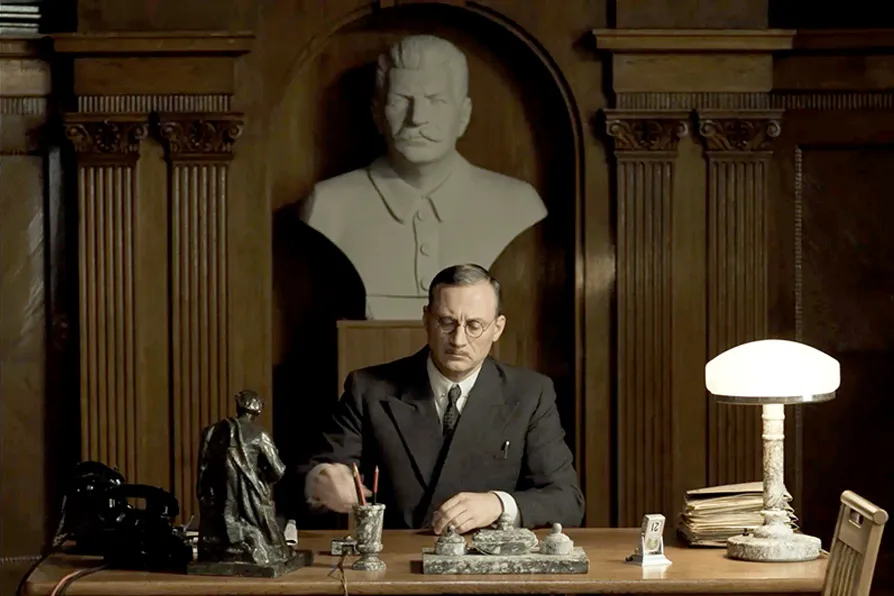RITA DI SANTO draws attention to a new film that features Ken Loach and Jeremy Corbyn, and their personal experience of media misrepresentation
RITA DI SANTO speaks to the exiled Ukrainian director Sergei Loznitsa about Two Prosecutors, his chilling study of the Stalinist purges

 BRUTAL REMINDER: Sergei Loznitsa's Two Prosecutors / Pic: Festival de Cannes
BRUTAL REMINDER: Sergei Loznitsa's Two Prosecutors / Pic: Festival de Cannes
UKRAINIAN director Sergei Loznitsa returns to Cannes, competing for the Palme D’Or with his latest film, Two Prosecutors. Loznitsa, one of the most significant directors of our era, is celebrated for his artistic skill and social awareness. Born in Belarus, he was raised in Kiev and trained at the VGIK film institute in Moscow, but now lives in exile in Berlin.
Since 1997, he has created more than a dozen films, both dramas and documentaries, delving into the effects of state violence from World War II to the conflict in Ukraine. His films focus on depicting the violence and cruelty of war, often reflecting on the suffering of ordinary people during such times.
Two Prosecutors is inspired by the book of the same name by Soviet physicist and author Georgy Demidov, who was arrested and sentenced to 14 years in the Gulag during the Stalinist purges. His work was suppressed for decades and only published in Russia after the collapse of the Soviet Union.
Two Prosecutors follows a young prosecutor, Alexander Kornev, who receives a letter from a prisoner, his former professor, falsely accused and showing signs of having been beaten and tortured. Kornev embarks on a quest to determine the truth but becomes entangled in a bureaucracy that is driven by terror, uncovering a world he had not anticipated. Through extended, deliberate scenes from a single camera, the film creates a deeply claustrophobic atmosphere. The machinery of fear and suspicion is central to Two Prosecutors, aiming not for justice but to instil fear — a psychological tool to control society.
The film echoes the literature of Gogol and Kafka that depict the powerlessnesses of the individual in a bureaucratic state, and surely intends to reflect the contemporary world through the same lens. “It could happen to any society,” says Loznitsa. Is this story a metaphor for what could happen in an authoritarian state today, including even the US? “There are people who have a real talent for making society bend to their deepest desire,” he states.
I met Loznitsa at the Cannes Film Festival to discuss his movie. Asked if the story feels relevant today, Loznitsa doesn’t hesitate. “Unfortunately, these topics remain relevant as long as totalitarian regimes exist anywhere in the world,” he said. “Even democratic societies are not immune to authoritarian impulses. That’s why the purges of the 1930s still matter — they need to be studied, reflected upon and understood.”
Loznitsa does not see any external forces that might compel Russia and Ukraine to sign a peace agreement now. “If there is no will, there is no way for peace,” he explains. “It’s like in a game of chess; somebody is trying to achieve an inch, and they need to fulfil their promises.”
Loznitsa is very similar to the young protagonist of his film, always searching for the truth with his films, embodying the struggles and complexities faced by ordinary individuals in a frighteningly oppressive world.
He has emphasised on many occasions that he considers himself a cosmopolitan man, “a man of the world.” Regarding his exile, he adds: “My situation is nothing, it’s really very small compared to the suffering that many people are enduring in war zone.”
But he believes in the power of cinema. “Cinema allows reflection on the world, offering a unique way to analyse and contemplate our surroundings. It is crucial for addressing issues that concern us and are shaping our future. Cinema impacts communication by creating a visual language, making information more accessible and informative. Reshaping this language through cinema would be a significant achievement.”
With his upcoming projects, he will continue to explore political power, examining how decisions to exterminate populations are made by politicians who prioritize their careers, personal gain, and power over human lives.
Two Prosecutors is on release throughout Europe and is still looking for a British distributor.

LEO BOIX, ANDY HEDGECOCK and MARIA DUARTE review Dreamers, It Was Just An Accident, Folktales, and Eternity

RITA DI SANTO reports on the films from Iran, Spain, Belgium and Brazil that won the top awards

RITA DI SANTO surveys the smorgasbord of films on offer at this year’s festival











